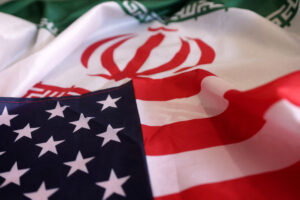
The National Interest Foundation Newsletter
Issue 196, June 23, 2023
Welcome to our NIF Newsletter. In this week’s headlines: we examine the new resolution streamlining the construction of illegal settlements in Palestine, look into the recent pledge to donate $1.5 billion to aid Sudanese refugees, and analyze the unofficial talks between the United States and Iran.
Written by Jacob Van Veldhuizen and Toni JeBailey
Dangers of Fast Tracking Settlement Construction

Streamlining the creation of illegal settlements puts both Palestinians and Israelis in danger. (Photo from AFP)
Israeli Cabinet Approves a Resolution Fast Tracking Illegal Settlement Construction
The recent passage of a resolution by the Israeli cabinet to speed up the process of constructing illegal Israeli settlements in the occupied West Bank will have repercussions that will alter the current order of Middle Eastern politics. This resolution removes any checks and balances from the settlement creation system and puts a racist extremist in charge of approving these illegal settlements.
Israel’s Finance Minister Bezalel Smotrich now has a majority of the authority in approving the creation and expansion of illegal settlements. Smotrich is part of the far-right coalition that makes up Prime Minister Benjamin Netanyahu’s government. A settler himself, Smotrich is a member of the Religious Zionist Party, which has roots in Kahanism. He is also the founder of a far-right NGO Regavim, which coordinated armed vigilante attacks against Palestinians. His connections and open support of these dangerous ideologies should disqualify him from ever serving in public office outright. Putting a settler in charge of settlements is a conflict of interest.
He also serves as a minister in the Defense Ministry and will surely use this dual position to force Palestinian residents from their homes. His connection to armed forces will allow Smotrich to utilize the Israeli military to kill any Palestinians who attempt to prevent the destruction of their homes.
Smotrich has also repeatedly made racist remarks about Palestinians, claiming that the Palestinian people are “an invention” from the last century and calling for Palestinian homes to be “closed and burned.” There have also been calls by legal experts to investigate Smotrich for “inducing war crimes” over his public support for violent raids on Palestinians.
This change in procedure will have wide-reaching consequences. It will lead to the creation of more settlements, forcing more Palestinians from their homes. The Israeli government has already announced that it plans to build 4,650 new housing units throughout the West Bank. The Civil Administration’s Higher Planning Committee is set to meet on June 26 to approve the construction. This illegal and inhumane treatment of the Palestinian people will only increase tensions between Israel and Palestine and will lead to more bloodshed. Israel will likely use this increase in resistance to justify killing more Palestinians. Already, violence has been escalating, with Israelis killing 5 Palestinians including a 15-year-old. 4 settlers were also killed in attacks recently. This move will also destroy any hope for a 2 state-solution. It is impossible for Palestine to reach any form of a peace agreement with Israel while Israel is actively stealing Palestinian land. Outside actors will have a significantly more difficult time getting the two sides to negotiate any form of a peace deal.
Israel’s continued march towards religious authoritarianism will eventually affect its relationship with the United States. This will not happen immediately, but rather, gradually. It will become less politically popular to continue to support Israel. Currently, support for Israel is still strong among most policymakers and the American public. Over time, however, this policy change and ones like it will have negative effects. As Israel continues to slide towards authoritarianism, it will make openly criticizing Israel more palatable for policymakers. There is also a small but growing portion of the American public that is voicing their disdain for Israel’s treatment of the Palestinians. The size of this group could serve as a bellwether for support of Israel in the United States. It is not likely that these two groups will grow quickly enough to have any impact on American support for Israel in the near future. Still, the existence and growth of these groups do suggest that American support for Israel is not entirely secure if Israel continues down this path.
Israel’s move towards full authoritarianism will also continue to destabilize the entire region. As oversight is dismantled and dissenting voices are silenced, Israel will begin to act with renewed aggression and become more volatile. As far-right extremists gain more power, Israel will become less stable. More Israelis will protest, more settlements will be created, and more people will be killed.
Sudan Donor Pledge

The recent donation pledges will fulfill roughly half of the required money that is needed to aid Sudanese refugees. (Photo from AP)
Donors Pledge $1.5 Billion for Sudan Crisis Response
The United Nations Humanitarian Chief Martin Griffiths has announced that international donors have pledged nearly $1.5 billion for aid efforts in Sudan and neighboring areas. Over 24.7 million individuals, more than half of Sudan’s population, are estimated to require relief due to the conflict between the Sudanese Armed Forces and the paramilitary Rapid Support Forces since April of this year. Substantial pledged donors include Germany committing $218 million (200 million euros) through 2024, the United States with $171 million, the European Union with $208 million (190 million euros), the Kingdom of Saudi Arabia with $100 million, and Qatar with $50 million. Donations were collected at a United Nations-backed event during a 72-hour ceasefire period within Sudan, with more than 80 state governments and international humanitarian organizations present. These donations factor into a more extensive global plea from the United Nations to garner support for relief efforts within Sudan, with initial estimations made at $2.57 billion. Before the event, only 17% of that goal had been fulfilled alongside a similar aid proposal, the Refugee Response Plan, which was only 15% financed. U.N. Refugee Agency Chief Filippo Grandi cited this lack of financing and international concern as being “deeply distressing” compared to the nature of the conflict. With the event’s conclusion, it is rumored that more donors from Middle Eastern Gulf States would continue to donate privately.
With over 365,000 refugees recorded since the start of the conflict, those affected are displaced within Sudan and neighboring countries. The aid is intended to help with relocation initiatives, food supply, medical assistance, and other issues resulting from the conflict. Still, there has yet to be any indication by the United Nations as to when and how the $1.5 billion will be dispersed. With contributing states such as Qatar donating 301 tons of food and medical assistance before the conference, it is hoped that the extent of aid will be amplified due to the increase in financing. Other donors, such as Saudi Arabia, have independently committed to continuing their relief efforts, such as implementing an air bridge equipped with 13 aircraft and a sea bridge carrying all types of assistance. Egypt, a neighboring state to Sudan, has taken in over 250,000 Sudanese refugees, around 60% of those affected by the conflict. It is still being determined to what extent the aid pledge will support nearby states that the crisis in Sudan has subsequently impacted. As the UNCHR reported that the lack of international interest and support had caused relief initiatives to remain underfunded, the impact of these newly pledged funds and endeavors holds great potential to provide the appropriate aid to Sudan and those affected.
With the recent conclusion of the 72-hour ceasefire and the instant resumption of fighting within Sudan, the need for aid and assistance remains more urgent than ever. Over 50 truckloads of resources were delivered to Khartoum within the first two days of the ceasefire, with the U.N. vocalizing its commitment to continue intervening despite the resurgence of violence. Yet, as any international aid is yet to reach Darfur and other surrounding areas, increases in looting, theft, and petty violence pose more roadblocks in effectively aiding all of Sudan. As the region of West Darfur hosts some of the greatest crimes against humanity due to the conflict, the hope is that future aid and support can be effectively delivered to the area as soon as possible. While the $1.5 billion pledge will hopefully help address the imminent concerns of medical assistance, food supplies, and shelter throughout Sudan, almost double that financial commitment is still needed to aid all of Sudan in addition to the nearby affected areas. Whether or not the current amount of aid allocated will effectively be disbursed is yet to be determined, as the United Nations must refine its methods of deliverance and allocation to ensure that it is equitably disseminated.
This large donation may be an indicator of what is to come. In the past years, due to many factors, donations to aid organizations have suffered a significant drop. This recent pledge of $1.5 billion gives hope that this trend is beginning to reverse and that aid organizations will be able to receive the funding they need to offer the full set of services they aim to offer.
Iran-U.S. Conversations

The undisclosed bilateral discussion between Iran and the U.S. may lead to a “mini-agreement.” (Photo from Reuters)
Iran-U.S. Conversations Within the Greater Scheme of Regional Power Dynamics
The Biden Administration and Iranian Officials are conducting undisclosed bilateral discussions regarding regional de-escalation and limitations on nuclear programs, with these conversations believed to have been occurring throughout the past few months. With all aspirations for reinstating the 2015 nuclear deal, the Joint Comprehensive Plan of Action (JCPOA), between the two states extinguished late last year, these talks aim to create immediate solutions to curtail security risks and weapon development. As the U.S.’s central goals remain to limit nuclear program expansion, inhibit proxy wars, and release American prisoners in return for sanction lifts for Iran, the nature of keeping talks secret yields an opportunity for the resumption of relations without criticism from the global community. The Biden Administration has denied any occurrence of these negotiations, with State Department spokesperson Matt Miller citing any conversation as merely an attempt at “understanding” between the United States and Iran. Yet, with multiple accounts of various American and Iranian officials meeting in Oman over the past months, including U.S. National Security Council official Brett McGurk and Iran’s chief nuclear negotiator Ali Bagheri Kani, the true extent of the status of potential deals remains to be discovered by the public. A significant reason for keeping the nature of the discussions ambiguous is for the Biden Administration to stay neutral with Israel, as fears of upsetting their ally motivate the continuation of closed-door talks.
Israeli Prime Minister Benjamin Netanyahu has gone on record to state that the potential of “mini-agreements” between the U.S. and Iran do not favor U.S.-Israeli relations and spoke out staunchly against them. As the U.S. and Israel share intelligence sources within the region, Israeli officials reported that these understandings have already made progress to some extent, including a deal in which Iran’s uranium enrichment would reduce to 60% in exchange for sanctions relief from the U.S. As there was opposition from Netanyahu regarding the initial 2015 JCPOA nuclear deal, the prospect of relations rekindling between Iran and the United States leaves the potential for counter-reaction from Israel. With the chance of releasing American prisoners in Iran rumored to be part of the agreements, the Biden Administration is backed into a corner with a decision to ensure the safety of Americans abroad or appease foreign allies. The families of these prisoners have requested multiple meetings with President Biden to no avail, and there is no telling if these discussions will finally broker the agreement to bring the Americans home. Yet, how these discussions also factor into the U.S.’s self-interest regarding ties with Saudi Arabia and rapprochement within the region remains ambiguous.
As the Biden Administration has attempted to facilitate the normalization of relations between Saudi Arabia and Israel, this, compared to Saudi Arabia and Iran’s recent deal brokered by China, leaves the region in an unforeseen era of diplomacy. In light of Blinken’s recent visit to Ridayh and China’s growing presence within the area, the validity of these “understanding” discussions may once more shift the way foreign affairs are conducted within the Middle East. Attempts of rekindling between Iran, Saudi Arabia, and Israel have occurred over the past few years. Recent bilateral agreements and discussions have reopened similar opportunities. With Saudi Arabia and Israel being positioned as allies against Iran, the warming of relations towards Iran by Saudi Arabia and the United States calls into question whether a path exists where all four states can agree or if shifting alliances will continue to reshape the Middle East. These desires by the Biden Administration come at a period in which the United States’ stake within the region is threatened as new power players such as China and Saudi Arabia grow closer and more robust. As a unique opportunity between Iran and the United States arises, the impact of these rumored “mini-agreements” will determine the new era of global security, nuclear production, and diplomacy.
